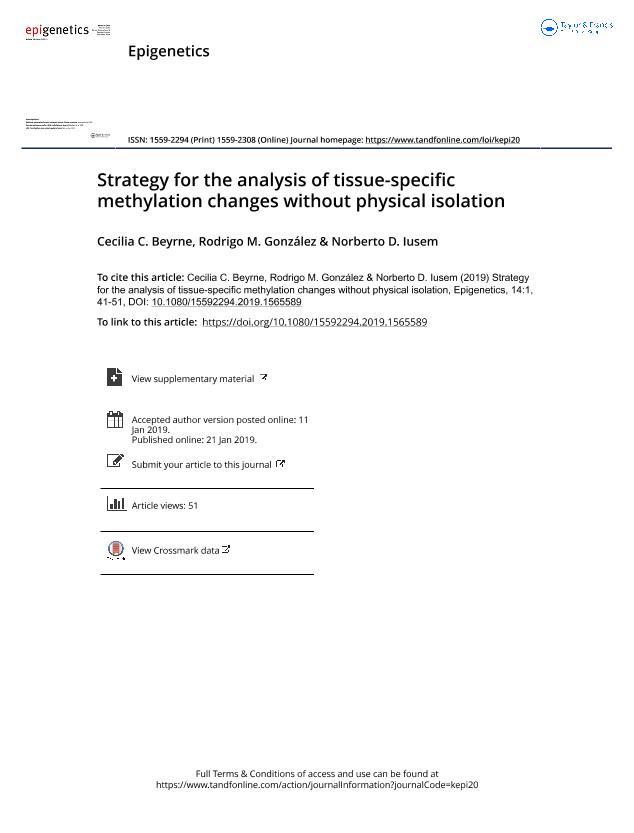Mostrar el registro sencillo del ítem
dc.contributor.author
Beyrne, Cecilia Carmen

dc.contributor.author
González, Rodrigo Matías

dc.contributor.author
Iusem, Norberto Daniel

dc.date.available
2021-01-22T14:52:10Z
dc.date.issued
2019-01
dc.identifier.citation
Beyrne, Cecilia Carmen; González, Rodrigo Matías; Iusem, Norberto Daniel; Strategy for the analysis of tissue-specific methylation changes without physical isolation; Landes Bioscience; Epigenetics; 14; 1; 1-2019; 41-51
dc.identifier.issn
1559-2294
dc.identifier.uri
http://hdl.handle.net/11336/123463
dc.description.abstract
One common experimental hurdle that arises when explore patterns of cytosine methylation is the generation of data derived from a single specific tissue, often arduous to isolate from a heterogeneous biospecimen. Here we show a new strategy for exploring environment- or mutation-caused changes in cell type- or tissue-specific methylation landscapes, which requires neither transgenic reporter cell lines nor physical separation. This approach takes advantage of a known distinct methylation signature existing in only one of the tissues within an organ under a particular condition. From the information on such compared published methylomes, one can design a set of PCR primers that specifically amplify bisulfite-converted DNA of two nearby genomic regions of interest, thus allowing for tissue-specific DNA methylation data. To validate the performance of the approach, we designed primers able to amplify a portion of a gene in the context of root biology: the Arabidopsis homeotic gene Glabra-2 (Gl2), expressed only in epidermis during cell differentiation. We found that the extent of methylated cytosines appears remarkably different when root epidermis-specific primers were used vs. non-specific ones under three genetic backgrounds involving mutations in genes also associated with the establishment of cell identity. Although the genetic or environmental perturbations to be studied might modify methylation in the primer-annealing zone, leading to a possible misinterpretation of the data, the strategy presented here can become a useful first round screening tool to detect differences in tissue-specific epigenetic status under new conditions.
dc.format
application/pdf
dc.language.iso
eng
dc.publisher
Landes Bioscience

dc.rights
info:eu-repo/semantics/openAccess
dc.rights.uri
https://creativecommons.org/licenses/by-nc-sa/2.5/ar/
dc.subject
ARABIDOPSIS
dc.subject
BISULFITE TECHNIQUE
dc.subject
DNA METHYLATION
dc.subject
GLABRA2
dc.subject
ROOT EPIDERMIS
dc.subject
TISSUE-SPECIFIC
dc.subject.classification
Bioquímica y Biología Molecular

dc.subject.classification
Ciencias Biológicas

dc.subject.classification
CIENCIAS NATURALES Y EXACTAS

dc.title
Strategy for the analysis of tissue-specific methylation changes without physical isolation
dc.type
info:eu-repo/semantics/article
dc.type
info:ar-repo/semantics/artículo
dc.type
info:eu-repo/semantics/publishedVersion
dc.date.updated
2020-11-13T20:41:06Z
dc.journal.volume
14
dc.journal.number
1
dc.journal.pagination
41-51
dc.journal.pais
Reino Unido

dc.journal.ciudad
Londres
dc.description.fil
Fil: Beyrne, Cecilia Carmen. Consejo Nacional de Investigaciones Científicas y Técnicas. Oficina de Coordinación Administrativa Ciudad Universitaria. Instituto de Fisiología, Biología Molecular y Neurociencias. Universidad de Buenos Aires. Facultad de Ciencias Exactas y Naturales. Instituto de Fisiología, Biología Molecular y Neurociencias; Argentina
dc.description.fil
Fil: González, Rodrigo Matías. Consejo Nacional de Investigaciones Científicas y Técnicas. Oficina de Coordinación Administrativa Ciudad Universitaria. Instituto de Fisiología, Biología Molecular y Neurociencias. Universidad de Buenos Aires. Facultad de Ciencias Exactas y Naturales. Instituto de Fisiología, Biología Molecular y Neurociencias; Argentina
dc.description.fil
Fil: Iusem, Norberto Daniel. Consejo Nacional de Investigaciones Científicas y Técnicas. Oficina de Coordinación Administrativa Ciudad Universitaria. Instituto de Fisiología, Biología Molecular y Neurociencias. Universidad de Buenos Aires. Facultad de Ciencias Exactas y Naturales. Instituto de Fisiología, Biología Molecular y Neurociencias; Argentina
dc.journal.title
Epigenetics

dc.relation.alternativeid
info:eu-repo/semantics/altIdentifier/doi/https://doi.org/10.1080/15592294.2019.1565589
Archivos asociados
